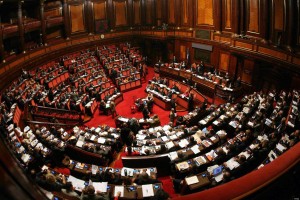NEWS Italy (at Last) Makes Holocaust Denial a Crime
By law n. 115 of 16 June 2016 Italy has finally enacted as law the crime of denying the Shoah or “negationism”. We say “at last” because the law concludes a legislative process that has lasted more than three years, with the Senate and the House of Deputies almost playing ping pong with a bill that was alternatively amended by one or the other Chamber which were each time unhappy with the text tentatively approved by the other. Indeed, the swift passing of the law, which was finally approved by a large majority, with a number of abstentions and almost no negative vote by the Chamber in the text finalized by the Senate, was hampered by perplexities from different parties as to the alleged limitations to freedom of expression that the prohibition of Holocaust denying would create under threat of criminal penalties.
Moreover, the supporters of the bill had to overcome the vocal opposition of an influential group of contemporary history specialists exposing the well-known argument that historical debates, even on theories which are clearly baseless and biased, should be left to historians, from which the legislator should keep out. A theory that ignores the blatant bad faith of the deniers and the danger that outrageous Holocaust denial through Internet represents, as the Italian Jewish community has tirelessly pointed out in support of the statute.
The delay in passing the legislation was even more striking if one considers that introducing criminal penalties for Holocaust denial had been made mandatory within five years for the member States of the European Union by a EU Framework Decision adopted in 2008, which in turn was based on a political compromise that has required years to be reached.
In itself the new provision is simple. It adds an aggravating circumstance to the existing statute n.654 of 1975 (new art. 3 bis) which had been originally enacted in order to enforce in Italy the UN Convention of 1966 against racial discrimination, a text which had been considerably reinforced by law n. 295 of 1993. The importance of the new provision is not so much that denial of the Holocaust, as well as of the crime of genocide, crimes against humanity and war crimes as defined in the Statute of the International Criminal Court (an extension provided by the EU Decision itself) is punished more severely than other forms of racist propaganda, hate and violence. It is the explicit mention of the denial in the new provisions that clarifies once for all that indeed Holocaust denial is a form of racism and a serious and worrying one, thus closing an interpretative loophole exploited by deniers to escape prosecution.
The complete text of the statute is now at follows.
” Art. 3. 1. Except if the facts represent a more serious crime, also for the purpose of enforcing art. 4 of the [UN] Convention [against racism],
(a) whoever makes propaganda of ideas based on racial or ethnically superiority or hate, or instigates the commission or commits acts of discrimination on racial, ethnically, national or religious grounds is punishable by imprisonment up to one year and six months or with a fine up to 6000 euros;
(b) whoever by whatever means instigates the commission or commits violence or provocation to violence on racial, ethnic, national or religious grounds is punishable by imprisonment from six months to four years.
Art. 3.3. Any organization, association, movement or group having among its aims the incitement to discrimination or to violence on racist, ethnic, national or religious grounds shall be prohibited. Any participant to such organization, association, movement or group, shall be punishable because of the mere participation or assistance by imprisonment from six months to four years. Any person who promotes or directs such organizations, associations, movements or groups shall be punishable because of this mere fact by imprisonment from one to six years.
Art. 3 bis. A penalty of imprisonment from two to six years shall be applicable if the propaganda, instigation or incitement, committed in a way that a real danger of dissemination ensues, is based in whole or in part on the negation of the Shoah, or of the crime of genocide, the crimes against humanity or war crimes as defined by Art.6, 7, 8 of the statute of the International Criminal Court ratified by law of 12 July 1999 n.232.”
The singling out of the Holocaust and the use of the very term Shoah is by itself quite significant.
*Giorgio Sacerdoti is the president of the Center of Jewish Contemporary Documentation (CDEC) in Milan.

